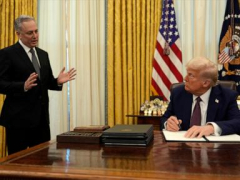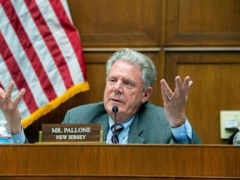When the Trump administration’s crypto czar, David Sacks, recently held a news conference to announce a new congressional working group to advance cryptocurrency regulation, many digital asset enthusiasts were unimpressed and underwhelmed.
“There were a lot of people on X who felt like this wasn’t, you know, a mind-blowing announcement,” Sacks said on a podcast a few days later, referring to the social media outlet formerly known as Twitter. But Sacks said having the White House and key members of Congress committed to passing key crypto legislation in the next year, possibly within six months, was worth celebrating. “We’ve never had that before, so that is pretty monumental,” he said.
Sacks’ defensiveness highlights a new reality in Washington: After spending heavily to help elect Trump and other crypto-friendly lawmakers, the industry is emboldened, impatient and eager to cement its influence in politics and mainstream financial systems.
“Time is critical,” Ji Hun Kim, president and acting CEO at the Crypto Council for Innovation said at a recent House committee hearing titled: “A Golden Age of Digital Assets: Charting a Path Forward.”
The crypto industry has scored some early wins since Trump took office, including the repeal of an accounting rule by the U.S. Securities and Exchange Commission and an executive order by the president directing a working group to study and propose changes to crypto regulations as well as the possible formation of a strategic government reserve of cryptocurrencies within 180 days.
As the industry calls for more substantive action, some crypto companies are looking to exert their influence by trying to punish old enemies.
Tyler Winklevoss, co-founder of the crypto exchange Gemini, said his firm won’t hire any MIT graduates as punishment for the school rehiring former SEC Chairman Gary Gensler to teach classes.
“Not even interns for our summer intern program,” Winklevoss said on X. The move came after Coinbase’s CEO announced his firm wouldn’t work with any law firms that hired any of Gensler’s former deputies who’d committed “bad deeds” toward the crypto industry. The Gensler SEC was the most aggressive financial regulator in trying to police the crypto industry.
Congress has held several hearings in rece





